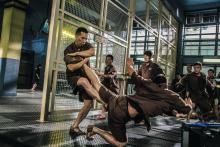Movie Review/ “Kung Fu Killer” (2015)
There is a special place in Oakulture’s heart for kung-fu films. We remember the days when the genre was scarcer than ninja scrolls and lovingly cherished by a subculture of cultish aficionados for whom Bruce Lee was only a starting point. There’s something to be said for the aesthetic of the Shaw Brothers studio’s prolifically classic output, not to mention the Zatoichi series, and all those low-budget, highly-entertaining Sonny Chiba movies. We witnessed the evolution and expansion of the genre during the 90s Hong Kong action film explosion, which brought about a resurgence in traditional kung-fu cinema (i.e. set in the past, often with elements of magical realism) and made international stars out of Jackie Chan and then Jet Li, along with the Asian gangsta ethos of John Woo and other modern HK directors’ urban ultra-violence dramas. The release of “Crouching Tiger, Hidden Dragon” showed the kung-fu actioner could be an Art Film as well – as long as plot and cinematography were up to the level of fight and training sequences. “Crouching Tiger” was a great film, and subsequent attempts to capture its momentum, including “Hero” and “House of the Flying Daggers,” helped to further legitimize kung-fu as a genre which could play the art house as well as the grindhouse.
That said, it can be argued that kung-fu genre films work better as B-movies, without the added pressure of trying to contend for Oscar nominations. A case in point: “Kung Fu Killer,” which opens April 24 at theaters near you.
Directed by HK legend Teddy Chen, “Kung Fu Killer” (released in China as “Kung Fu Jungle”) doesn’t want to be “Crouching Tiger”; its frame of reference is more the traditional martial arts films churned out by the Shaw Brothers and Golden Harvest, which relied mainly on hand-to-hand displays of skill. There’s very little of the acrobatic wire work made famous by Yuen Woo Ping, and no CGI. The result is a modern movie with a pronounced old-school aesthetic.
Donnie Yen, an veteran action star and choreographer last seen in “Ip Man,” plays the lead role of Hahou Mo, a disgraced martial arts instructor. Yen opens the movie by turning himself into police after killing a man in a duel. When masters of various martial arts disciplines are targeted by a serial killer, Yen stages an exciting prison fight to get the attention of the police, so he can offer his services.
He’s pitted against Fung Yu-Sau (Wang Baoqiang), a man who has overcome a physical disability—he’s clubfooted—to master many different fighting styles: boxing, kicking, grappling, weapons and qi. That makes for an interesting set-up, wherein each style is showcased during a fight sequence. Fung’s motivations are driven by grief—he recently lost his wife to cancer—but also by competitive ambition: he wants to become the best, by defeating the best.
The first half of the movie mainly consists of imaginative fight scenes, as Fung targets the martial arts masters. One memorable contest takes place on a giant model of a human skeleton; another pits an x-acto knife against an iron bar (guess which weapon wins?). There’s a thrilling chase scene from rooftops to alleys. Both lead characters are haunted by flashbacks, and their symbiotic connection isn’t just coincidental.
Once Fung achieves his initial objective, the movie slows down considerably and becomes more intellectual, probing Hahou’s motives as it advances toward the inevitable climactic showdown. A fishing village becomes the backdrop for a boat chase, while the final fight scene—on a freeway, with semi trucks whizzing past—is right up there with the train fight from “Drunken Master 2.”
“There’s always a message in kung-fu films, especially the older ones. Something about culture is going to be showcased. The hero is going to go on a journey, he’s going to be taught a lesson. It’s usually around family or pride.” – Malcolm Hoover on “Kung Fu Killer”
At this time, Oakulture would like to introduce guest commentator Malcom Hoover, of Deepculture , a kung-fu aficionado and member of the Black Nerd Squad, who weighs in with his thoughts on “Kung Fu Killer.”
According to Hoover, the film is “murderously fantastic.”
He adds: “One thing I always watch in Asian films, particularly Chinese films, is the cultural content of it, what cultural values are reflected. I really liked seeing the wisdom of kung-fu and martial arts culture wrapped into a modern context. Here was somebody who was a martial arts instructor… an honorable (man) whose pride got the better of him, which led to his fall. Humility is always emphasized in martial arts. And then, his pride continued to get the better of him, even while he was helping (the police catch the killer).”
For Hoover, “it wasn’t just the action sequences, which I love, but the morality tale of it. Once he succumbed and became humble, the way opened for him… and even in the end, he didn’t win by his own devices.”
“Kung Fu Killer” calls itself an homage to Hong Kong action film tradition, as evidenced by its underlying message. “There’s always a message in kung-fu films,” Hoover says. “Especially the older ones. Something about culture is going to be showcased. The hero is going to go on a journey, he’s going to be taught a lesson. It’s usually around family or pride.”
The villain’s motivations also captured Hoover’s interest. “It’s his anger at his wife’s condition that drives him to be the anti-hero to the hero… the anti-hero has an interesting backstory, even more than the hero.”
At its best, “Kung-Fu Killer” melds a traditional martial arts film like Chan’s “Snake and Crane Arts of the Shaolin” – which is referenced with a screenshot tribute –with the sophisticated, almost “Godfather”-esque crime story Woo mined to perfection in “Bullet in the Head.” But while guns, cars, cel phones and other modern accoutrements are accounted for, “Kung-Fu Killer”’s heart lies in telling a variation on well-worn martial arts tropes, and leaving the viewer with a renewed appreciation for slam-bang fight scenes and action choreography, while raising deeper philosophical questions about whether the competitive drive to be #1 is even necessary.
Ratings: three black fists (Deepculture); three and one/half black fists (Oakulture).




